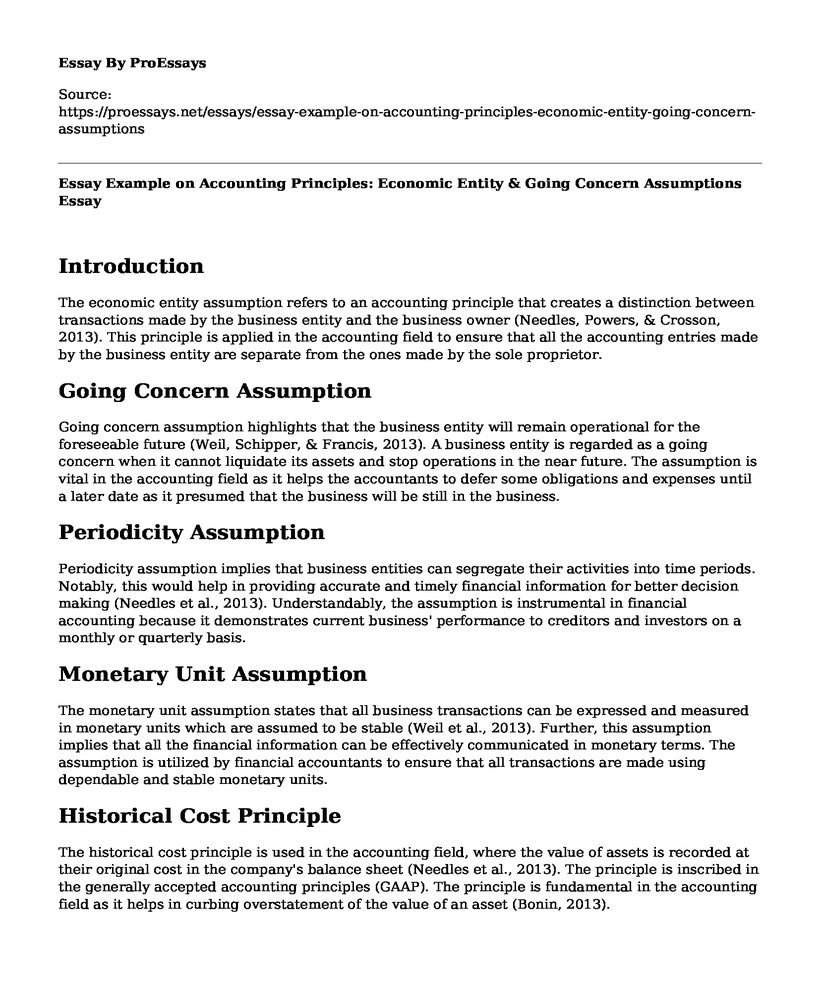Introduction
The economic entity assumption refers to an accounting principle that creates a distinction between transactions made by the business entity and the business owner (Needles, Powers, & Crosson, 2013). This principle is applied in the accounting field to ensure that all the accounting entries made by the business entity are separate from the ones made by the sole proprietor.
Going Concern Assumption
Going concern assumption highlights that the business entity will remain operational for the foreseeable future (Weil, Schipper, & Francis, 2013). A business entity is regarded as a going concern when it cannot liquidate its assets and stop operations in the near future. The assumption is vital in the accounting field as it helps the accountants to defer some obligations and expenses until a later date as it presumed that the business will be still in the business.
Periodicity Assumption
Periodicity assumption implies that business entities can segregate their activities into time periods. Notably, this would help in providing accurate and timely financial information for better decision making (Needles et al., 2013). Understandably, the assumption is instrumental in financial accounting because it demonstrates current business' performance to creditors and investors on a monthly or quarterly basis.
Monetary Unit Assumption
The monetary unit assumption states that all business transactions can be expressed and measured in monetary units which are assumed to be stable (Weil et al., 2013). Further, this assumption implies that all the financial information can be effectively communicated in monetary terms. The assumption is utilized by financial accountants to ensure that all transactions are made using dependable and stable monetary units.
Historical Cost Principle
The historical cost principle is used in the accounting field, where the value of assets is recorded at their original cost in the company's balance sheet (Needles et al., 2013). The principle is inscribed in the generally accepted accounting principles (GAAP). The principle is fundamental in the accounting field as it helps in curbing overstatement of the value of an asset (Bonin, 2013).
Conservatism
Conservatism principle refers to an accounting concept that involves recognition of liabilities, especially when there is uncertainty concerning the business outcome and recognizing revenues when there is certainty about their occurrence (Bonin, 2013). The principle further highlights that only transactions resulting in a lower amount of revenues should be recognized. The concept is used in the financial accounting field to ensure that businesses record losses when there is uncertainty about loss and not recording gains when there is uncertainty about gains.
Matching Principle
The matching principle is a concept used in the accounting field to guide a business entity in reporting expenses on the income statement to match the period in which the gains were made (Weil et al., 2013). The principle dictates that liabilities should be recorded in the balance sheet after the end of the accounting period. The principle is applied in financial accounting to ensure that the expenses which are not related to revenues are recorded in the income statement (Bonin, 2013).
Full-Disclosure Principle
The full-disclosure principle refers to a concept used in the accounting field that dictates that a business entity should disclose all their financial information and other important information to the relevant people who may require such information (Needles et al., 2013). The principle is integral in the accounting field to ensure that users of the entity's financial information are not misguided by the absence of information.
Materiality
The materiality concept refers to the accounting principle that emphasizes the relevance of the business information and the nature of the transactions made (Bonin, 2013). Notably, this principle is vital as it guides financial accountants to prepare the much-needed business financial information.
Revenue Recognition
Revenue recognition is an accounting principle that highlights the conditions under which revenues are recognized and establishing how they can be accounted for (Weil et al., 2013). The concept is important in the accounting field as it determines how revenues can be recognized.
Cost-Effectiveness
The cost-effective principle is used in the accounting field to refer to all transactions that result in great benefits at a low cost (Bonin, 2013). The principle is vital as it results in increased sales which exceed the cost of the products. Also, the principle is effectively applied in financial accounting to guide in choosing the investment options.
References
Bonin, H. (2013). Generational accounting: theory and application. Springer Science & Business Media. https://books.google.co.ke/books?hl=en&lr=&id=VKrwCAAAQBAJ&oi=fnd&pg=PA1&dq
Needles, B. E., Powers, M., & Crosson, S. V. (2013). Principles of accounting. Cengage Learning. https://books.google.co.ke/books?hl=en&lr=&id=pa4WAAAAQBAJ&oi=fnd&pg=PR3&dq
Weil, R. L., Schipper, K., & Francis, J. (2013). Financial accounting: an introduction to concepts, methods and uses. Cengage Learning. https://books.google.co.ke/books?hl=en&lr=&id=aF9GnzmDoeEC&oi=fnd&pg=PR5&dq
Cite this page
Essay Example on Accounting Principles: Economic Entity & Going Concern Assumptions. (2023, Mar 26). Retrieved from https://proessays.net/essays/essay-example-on-accounting-principles-economic-entity-going-concern-assumptions
If you are the original author of this essay and no longer wish to have it published on the ProEssays website, please click below to request its removal:
- Assignment Example on Microeconomics
- Essay Sample on Cost Center Accounting Practices in Germany and USA
- Increase the Minimum Wage to Reduce Income Inequality in the United States - Essay Sample
- Wage Gap Between Men and Women - Essay Sample
- Enron's Collapse: An Analysis Of The Root Causes
- Paper Example on Globalization: Shaping the Present and Future
- Essay on Uber's Global Expansion: The Result of Savvy Marketing and Modern Payment Methods







